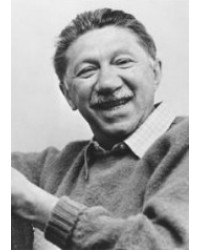Abraham Maslow

Abraham Harold Maslow (1908–1970) was an American psychologist who was best known for creating Maslow's hierarchy of needs, a theory of psychological health predicated on fulfilling innate human needs in priority, culminating in self-actualization. Maslow was a psychology professor at Alliant International University, Brandeis University, Brooklyn College, New School for Social Research, and Columbia University. He stressed the importance of focusing on the positive qualities in people, as opposed to treating them as a "bag of symptoms." A Review of General Psychology survey, published in 2002, ranked Maslow as the tenth most cited psychologist of the 20th century.
In 1908, Abraham H. Maslow was born, the first of seven children, to immigrant Russian Jewish parents, in New York City. He received his BA in 1930, his MA in 1931 and his Ph.D. in 1934, all in psychology, from the University of Wisconsin-Madison. Maslow taught full time at Brooklyn College, then at Brandeis, where he was named Chair of Psychology in 1951. Maslow, a humanist-based psychologist, is known for proposing the "hierarchy of needs" to be met so an individual can achieve "self-actualization." In analyzing achievers, Maslow found they were reality-centered. Among his many books was Religion, Values and Peak-Experiences, which is not a freethought treatise, but which did not limit "peak experiences" to the religious or necessarily ascribe such phenomena to supernaturalism. In the book's introduction, Maslow warned that mystics may become "not only selfish but also evil," in single-mindedly pursuing personal salvation, often at the expense of others. Maslow was named Humanist of the Year by the American Humanist Association in 1967.
Later in life, Maslow was concerned with questions such as, "Why don't more people self-actualize if their basic needs are met? How can we humanistically understand the problem of evil?"
In the spring of 1961, Maslow and Tony Sutich founded the Journal of Humanistic Psychology, with Miles Vich as editor until 1971. The journal printed its first issue in early 1961 and continues to publish academic papers.
Maslow attended the Association for Humanistic Psychology’s founding meeting in 1963 where he declined nomination as its president, arguing that the new organization should develop an intellectual movement without a leader which resulted in useful strategy during the field’s early years.
On his religious views, Maslow was an atheist.
While jogging, Maslow suffered a severe heart attack and died on June 8, 1970, at the age of 62 in Menlo Park, California.



